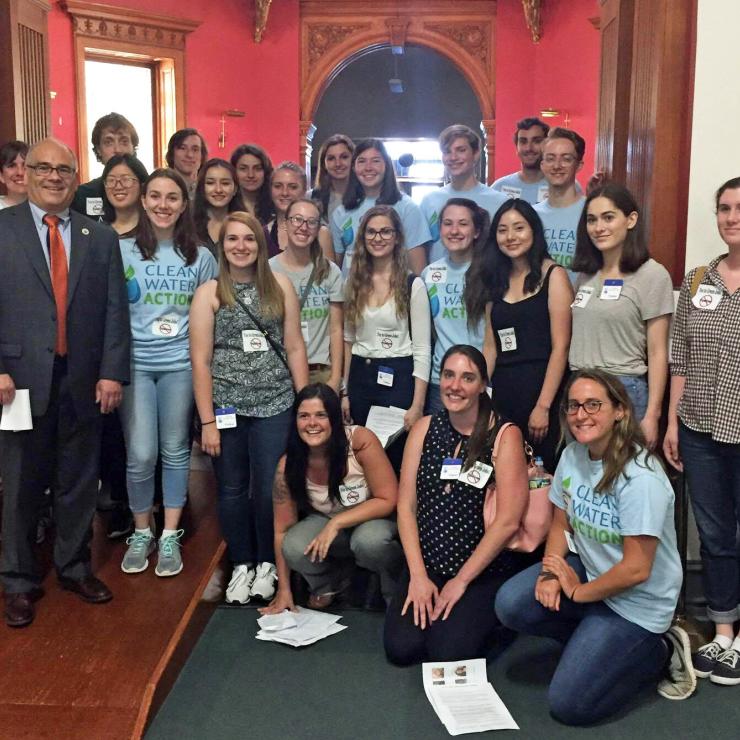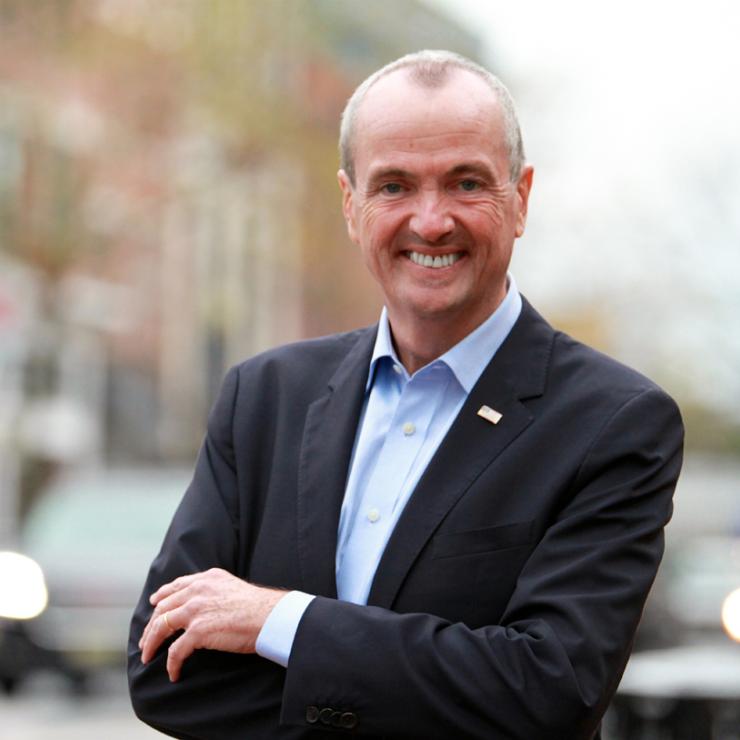Download
Contents
- Christie & Trump Chopping Core Environmental Protections - Read more
- Yes to Green Jobs, No to Dirty Pipelines — Read more
- Murphy for Governor.— Read more
- Stay Cool – Be Safe — Read more
- Straws are Out, the Environment is In at Asbury Park Boardwalk Restaurants - Read more
- You are Invited! Clean Water Action's 7th Annual Autumn Toast Charity Auction —Read more
Christie & Trump Chopping Core Environmental Protections
By David Pringle, Campaign Director

While Christie’s efforts to hold the state budget hostage largely failed, real damage was done — state parks closed, tens of thousands put out of work, businesses hurt, and faith in government took another hit. The approved state budget includes continued raids on clean energy and natural resource restoration funds. But there is light at the end of that tunnel as Christie’s days in office are numbered.
Unfortunately, the same cannot be said in Washington. As you know, the young Trump Administration’s attack on core environmental protections is accelerating with help from the Republican-led Congress. The summer months started off with Congress considering the President’s proposed budget that would decimate the federal Environmental Protection Agency (EPA), and its clean energy, air and water programs. In late June, his Administration proposed gutting the federal Clean Water Act and never ceases to side with Big Oil & Gas including new proposals to drill off the Jersey Shore.
Clean Water Action is determined not to let our hard won victories of the past be overturned. The Garden State’s congressional delegation, especially U.S. Representative Rodney Frelinghuysen as Chair of the House Appropriations Committee, can be a difference maker at the national level.
To that end, Clean Water Action recently led 31 groups to sign a joint letter to Frelinghuysen requesting a meeting, and to stand up to Trump’s devastating budget cuts. Together, these groups represent tens of thousands constituents. The proposed 31% cut to the EPA includes the total elimination of lead poisoning, environmental justice, climate and Jersey Shore beach water quality monitoring for bacteria programs.
Unfortunately, Congressman Frelinghuysen has been largely unresponsive to date other than expressing some concern for the Superfund cuts (for toxic waste cleanup), but remains “animus” (or hostile) towards the EPA. This is especially disturbing because roughly 30% of NJ Department of Environmental Protection’s (NJDEP) funding comes from the federal government.
As a state that already sends more tax dollars to the federal government than we get back, New Jersey cannot afford to pick up that much slack. That is why Clean Water Action is organizing a broader public outcry to stop this budget in its tracks. Every day, its door to door canvass talks to people one-on-one, garners support and generates personalized letters (more than any other organization) from New Jersey residents in targeted congressional districts. All across the state and regardless of party affiliation, constituents are telling their U.S. Representatives not to support a federal budget that places unnecessary burdens on our state, the environment and the health of our families.
Whether it’s for Superfund, drinking water, the Jersey Shore, Delaware, Raritan and Barnegat Bays, clean air, or environmental justice in our urban centers, New Jersey needs more not less environmental funding, as well as state and federal officials on both sides of the aisle who will fight for it. Clean Water Action knows it count on New Jersey’s two U.S. Senators, Booker and Menendez; but need the state’s Republican Congressmen (particularly Frelinghuysen, but also Lance, LoBiondo, MacArthur, and Smith) to turn the tide towards the environment and public health.
Take action by writing a letter today! As a constituent, you have the power to make a difference in what your representatives do in office and how long they stay in office. The key votes here are expected in September. See how your U.S. Representative rates on Clean Water Action’s Tracker. New Jersey’s delegation has some shining stars who scored high, even 100%, for the environment and need to be thanked. But do not let the zeroes and low scorers go unchecked. They need to hear from you loud and clear.
Yes to Green Jobs, No to Dirty Pipelines
By Alyssa Bradley, Energy Organizer

State elected officials and candidates can’t do enough to stop dirty deals like the PennEast, Transco, South Jersey Gas, Pilgrim and NJ Natural Gas pipelines, compressor stations, and oil bomb trains and Trump’s oil drilling plan just off the Jersey Shore.
New Jersey is long overdue in taking back its leadership role in growing its clean energy capacity, green infrastructure, jobs, and environmental protections. That’s why 100 activists from Clean Water Action, Delaware Riverkeeper Network, Environment New Jersey, and Sierra Club held a “Stop Pipelines and Dirty Fuels” lobby day in Trenton on June 22.
While there are many actions on many fronts needed, our lobby day got some immediate results. We successfully stopped Assembly Bill #A4849 which weakens ethics laws to permit Pinelands Commissioners to vote when they have a conflict of interest on controversial pipeline proposals. They tried again a week later (6/29) and failed due to ongoing pressure from Clean Water Action and others.
Other measures that we hoped would pass, but no action either way was taken include:
- Senate Resolution SCR66 (already passed Assembly) — overturns new NJDEP flood hazard rules that permit new pipelines in environmentally sensitive areas and are inconsistent with the legislature’s intent to protect water quality;
- Assembly Bill #A2203 (already passed Senate) — increases amount of electricity sold in NJ from renewable energy every 5 years so that 80% is reached by early 2050; and
- Senate and Assembly Resolutions SR22/A35 — which opposes the Penn East pipeline — 43 Democratic and 7 Republican legislators have already signed a letter urging NJDEP to deny a key water quality permit it needs.
The power of an active citizenry has been proven yet again. But these bills (good and bad) are not dead, just dormant with the legislature now on summer recess and back in their districts campaigning for re-election this November. Anything can still happen between now and late January 2018 (and on a moment’s notice) when a new governor and legislature are sworn into office.
Murphy for Governor

To that end, Clean Water Action has endorsed Phil Murphy for Governor and stood with him when he announced his environmental justice agenda. Murphy has put forth the strongest leadership and most comprehensive environmental platform of any candidate by proposing to:
- launch in his first 100 days a job-creating climate change and clean energy agenda to get to a 100 percent clean energy economy by 2050 including 3500 MW of offshore wind by 2030 and 600 MW of energy storage by 2020;
- commit to a first of its kind environmental justice agenda including giving state government and communities the ability to stop cumulative and disproportionate impacts of pollution in low income and Of Color communities; and
- effectively challenge, and provide a real strong alternative to, the Trump anti-environment agenda.
New Jersey needs strong leadership in our next Governor to make New Jersey a national leader again, dare it be said to “make New Jersey great again.” Phil Murphy will be that governor.
Stay Cool - Be Safe
By Jeanette Mitchell, Climate Organizer

There are growing concerns and evidence connecting rising temperatures and public health of young, elderly and pregnant women. When temperatures reach 89.6oF or higher over a period of 4 to 7 days, the risk of early-term delivery is 27% higher than on typical summer days, according to a study.
Los Angeles’ public health data reveals a fourfold increase in heat wave-related incidences including premature labor (at 29 weeks) due to dehydration, strokes, cardiovascular distress, elderly and sports-related deaths. We expect New Jersey’s cities feel similar adverse heat impacts as well.
Increased heat will also peak electricity loads which may lead to area-wide black outs. Whether we experience no power or can’t afford to pay for it, our most vulnerable populations are put at risk. Here are commonsense tips for staying cool and safe:
- Drink plenty of water even if you don’t feel thirsty. Avoid soft drinks and alcoholic beverages as they contain sugars and salt that will cause the body to become dehydrated.
- Avoid being outside during peak heat hours mainly from 11am–1pm and wear loose, lightweight, light-colored clothing and take cool showers and baths.
- Check on a friend or neighbor and have someone do the same for you. Having a buddy system with your neighbors is key to making sure that those who are most vulnerable to heat distress such as the elderly, disabled and sick are well.
- Instead of hot foods, try lighter summer fare including frequent small meals or snacks containing cold fruit or low fat dairy products. As an added benefit, you won’t have to cook next to a hot stove.
- One of the best protections against heat related illness and death is air conditioning (AC). If you also use a fan while in the house, you will be able to turn your AC on low and circulate more cool air while also saving on your electric bill. Do not rely on a fan as your primary cooling devise during an extreme heat event. If you do not have an air conditioner, go somewhere that does (e.g. library, community cooling center, store or other public space).
Straws are Out, the Environment is In at Asbury Park Boardwalk Restaurants
By Kate Triggiano, Rethink Disposable Coordinator
This initiative is part of Clean Water Action’s larger national Rethink Disposable™ program (www.rethinkdisposable.org). Clean Water Action has a proven successful track record working with restaurants and institutions to voluntarily reduce waste caused by single-use disposables (SUDs), such as plastic straws, cutlery, plates, water bottles and foam containers. In doing so, they have reduced their environmental footprint, cost of waste disposal and supply purchases, while increasing customer satisfaction and demand for greener-conscious restaurants. The Rethink Disposable™ program in Asbury Park is funded by an agreement awarded by the U.S. Environmental Protection Agency (EPA) to the New England Interstate Water Pollution Control Commission. Our soon to be launched program in the Newark-Montclair area is possible with the support of the Environmental Endowment for New Jersey.
You are Invited! Clean Water Action's 7th Annual Autumn Toast Charity Auction

